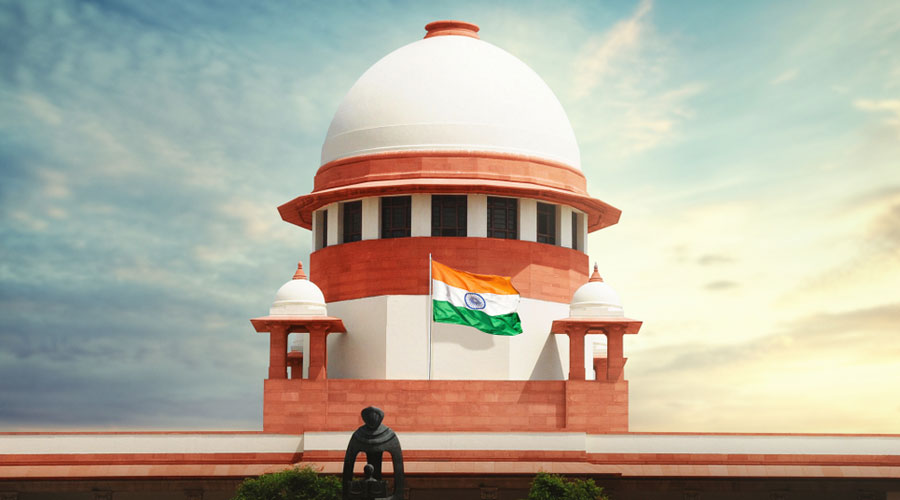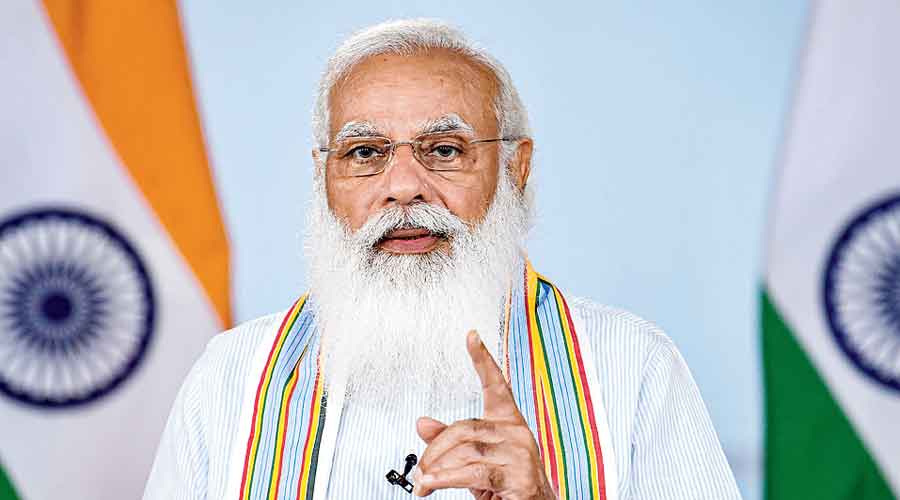The Narendra Modi government scrambled on Thursday to reinstate Justice Ashok Iqbal Singh Cheema as chairperson of the National Company Law Appellate Tribunal (NCLAT) to enable him to complete his term on September 20 after the Supreme Court threatened to suo motu stay the Tribunal Reforms Act, 2021.
The successor, appointed prematurely, will go on leave until Justice Cheema’s tenure ends next week.
Veterans said this was possibly the first time a retired chairperson of a judicial or quasi-judicial outfit had been reinstated and the incumbent sent on leave.
The attorney-general consulted the Centre and agreed to the reinstatement after an apex court bench helmed by Chief Justice of India N.V. Ramana warned the government of staying the Tribunal Reforms Act, 2021, through which the government has arrogated to itself the power to ensure that a tribunal member remains in office “until further orders”.
The court is hearing another case challenging the act’s provisions and had on Wednesday blasted the government for saying it had the right to reject names recommended for tribunals.
Incumbent NCLAT chairperson Justice M. Venugopal, a former Madras High Court judge, will remain on leave till September 20, when Justice Cheema’s tenure is scheduled to end, as there cannot be two chairpersons.
During Thursday’s hearing, attorney-general K.K. Venugopal had initially tried to resist the reinstatement of Justice Cheema, abruptly sent on early retirement on September 16 by the Centre that cited the new Tribunal Reforms Act. AG Venugopal reasoned that sending Justice Venugopal on leave would create an “awkward” situation.
CJI Ramana replied: “Mr Attorney, tell us, how fair is it? He (Justice Cheema) has some judgments to pronounce. If you retire him, there will be a problem of rehearing those cases. The way these orders were passed was also very awkward. You have created this awkward situation.”
After sending Justice Cheema into early retirement with retrospective effect from September 11, the Centre had appointed Justice Venugopal on September 16 itself. Justice Cheema had approached the Supreme Court against the government’s decision.
Senior advocate Arvind Datar, representing Justice Cheema, had on Wednesday urged the CJI to list the matter for urgent hearing. Accordingly, the matter was listed on Thursday before the bench that also had Justices Surya Kant and Hima Kohli.
AG Venugopal told the court that the government was willing to reinstate Justice Cheema “only on paper” as it would be “awkward” to send Justice Venugopal on leave. Datar opposed the submission, contending that there was no provision for appointing or reinstating a tribunal chairperson “on paper”.
CJI Ramana agreed with Datar and said Justice Cheema had to pronounce five judgments and, therefore, there could not be any question of his reinstatement only on paper.
The AG submitted that “it will be odd and awkward” to remove the current officiating chairperson and bring back Justice Cheema to complete his tenure.
AG Venugopal said the decision to prematurely retire Justice Cheema was in tune with the new legislation under which the Centre enjoyed “certain powers”.
Justice Ramana then warned the government: “We will suo motu stay your legislation.” This prompted the AG to seek instructions from the government. The bench adjourned the matter for half an hour to enable the government’s highest law officer to seek the Centre’s stand.
When the hearing resumed, AG Venugopal told Justice Ramana that the government had agreed to reinstate Justice Cheema and allow him to continue till September 20 and Justice Venugopal would be asked to go on leave until September 20.
The top court recorded this in its order and closed the case, saying: “The attorney-general has solved the problem. We thank you for this.”
Later, the court passed the following written order:
“Heard learned senior counsel appearing on behalf of the petitioner as also Mr K.K. Venugopal, learned attorney-general for India, and carefully perused the material placed on record. During the course of hearing, learned attorney-general fairly states that respondent No. 1 — the Union of India — has no objection… to allow the petitioner to work up to 20.09.2021 as the Officiating Chairperson, National Company Law Appellate Tribunal, New Delhi, to enable him to pronounce the judgments prepared by him.”
“…Learned attorney-general further submits that… consequential order will be passed by the respondents forthwith. It is also the submission of the learned attorney-general that respondent No. 3 (Justice M. Venugopal) will proceed on leave up to 20.09.2021.
“Taking note of the submissions advanced by the learned attorney-general for India, the writ petition stands disposed of in the above terms. We make it clear that the instant order has been passed taking into consideration the peculiar facts and circumstances of the present facts and this shall not be treated as a precedent….”
Justice Cheema, a former judge of Bombay High Court, was appointed as a judicial member of the NCLAT in September 2017 and thereafter made its chairperson on April 19, 2021. He was to demit office on September 20 after completing his tenure of five years.
According to the Tribunals Reforms Act, 2021, a member has to retire either after four years of service or at the age of 67 and can stay in office “until further orders”. This is contrary to the Supreme Court’s earlier ruling that a member should have a minimum tenure of five years or until the incumbent attains the age of 70.
The new tribunal rules have been challenged before the Supreme Court in separate petitions filed by the Madras Bar Association and Congress leader Jairam Ramesh as being unconstitutional, arbitrary and illegal. They have contended that the new law has been enacted to circumvent the earlier judgments of the Supreme Court that had ruled in favour of complete autonomy and independence of quasi-judicial institutions like the NCLAT.
In 2019, a five-judge constitution bench had struck down an amendment made to the appointment and removal process by the government under the Finance Act, 2017. The Modi government had then brought an ordinance with similar provisions, which too was struck down by the apex court in April this year on a petition filed by the Madras Bar Association.
Subsequently, a three-judge bench headed by Justice Nageswara Rao reiterated that the constitution bench had struck down some amendments made by the Centre in 2020 to dilute the effects of the 2019 judgment. However, the Centre again came out with a fresh legislation to override both the constitution bench and the subsequent ruling by the Supreme Court.












